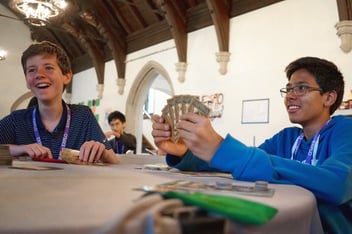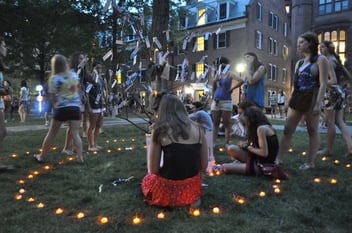Creating a Place for ‘Twelves’ to Thrive: Seventh Graders at EXPLO
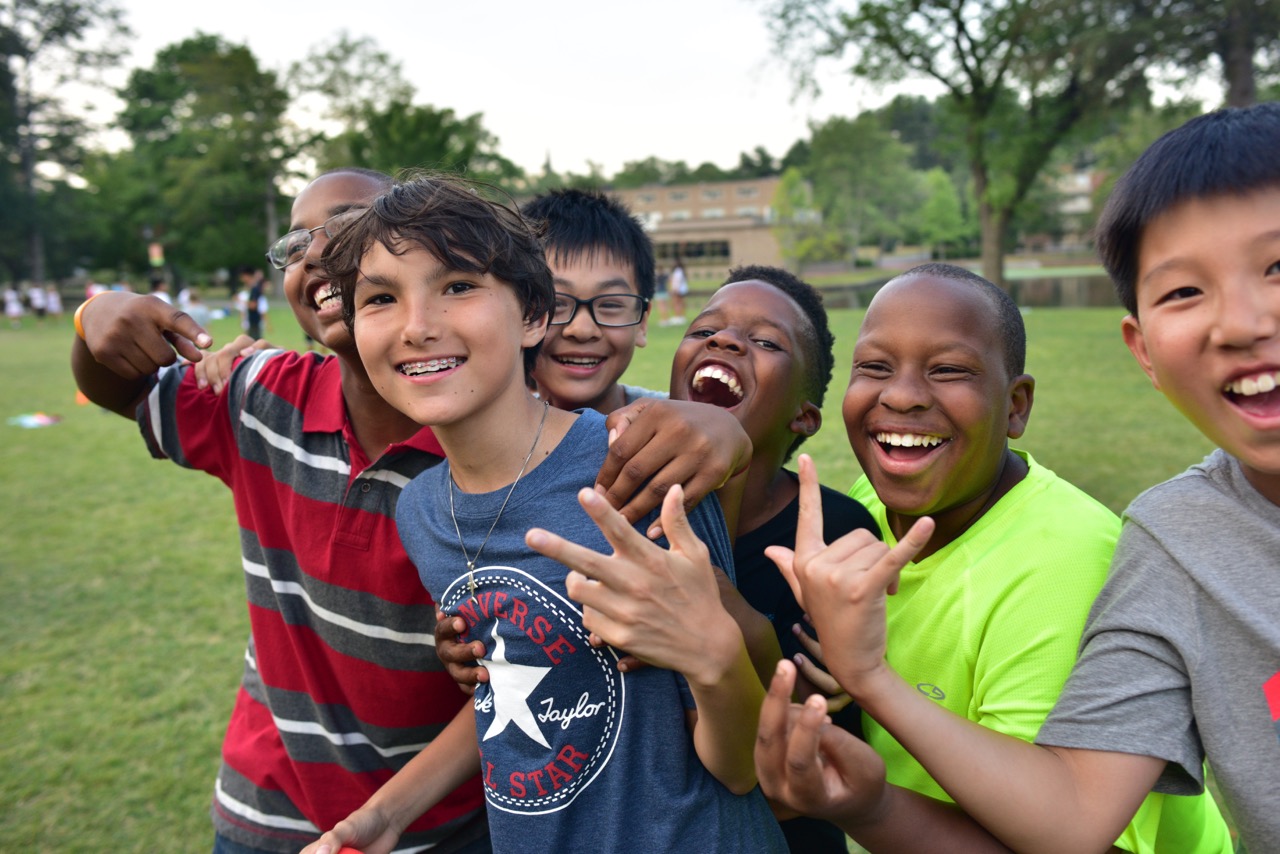
Students hang out during a sevent-grade only event, "7th-Hour".
In his acclaimed book, Yardsticks, lifelong educator Chip Wood writes with candor and insight about the developmental markers that shape each year of a child’s life. He outlines the cognitive, social-emotional, and physical needs of each age group and suggests various teaching strategies to best work with each group of students.
When he comes to the age of 12 however, he begins by saying:
“Junior highs that include grades seven, eight, and nine; middle schools with grades six, seven, and eight; schools that are K-8 — we’ve tried them all during the past forty years, yet we’re still trying to figure out how best to reach and teach the 12-year-old child… The truth may be that there is no perfect place for twelves.”
Whether you are a parent, teacher, or any other adult, you have either had the privilege of working with seventh graders, or may even remember (perhaps with a slight grimace) when you were one yourself. Seventh grade comes with so many questions. Kids at this age are struggling to shape their identities, and in so doing they are in the throes of challenging previously held assumptions and adult ideas.
Seventh graders are increasingly able to think in the abstract, applying this more complex way of thinking to the material they are learning in the classroom and to the wider world we live in. They are better able to see and understand multiple perspectives (when they are willing to take a look). And in their search for meaningful relationships, their friends are critically important.
[Seventh graders] are better able to see and understand multiple perspectives (when they are willing to take a look). And in their search for meaningful relationships, their friends are critically important.
When EXPLO was first started more than 40 years ago, seventh graders lived and learned with the eighth and ninth graders at our EXPLO at Wellesley program — much like you would expect to find in many middle or junior high schools. But our 12-year-old friends didn’t quite fit there. Their cognitive skills are still emerging and though they are beginning to flex their independence and explore their emerging adult personality, 12-year-olds can still be quite childlike and feel overwhelmed among 14-year-old peers.
If Wood is correct, and there really is no perfect place for our 12-year-old friends, it seemed to us that we should create a space where seventh graders can thrive at EXPLO. Our solution was to move them to the EXPLO at Wheaton program, where they are able to exercise their newfound independence in a way that feels fully supported.
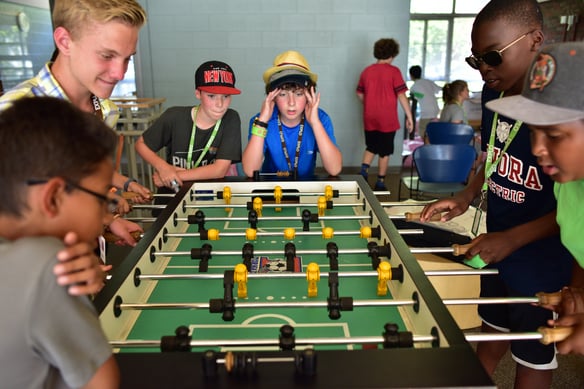 Students play foosball in the Seventh Grade Lounge during designated residential living time.
Students play foosball in the Seventh Grade Lounge during designated residential living time.
Supporting Social Allegiances
For children, the balance of social allegiances towards adults vs. peers (or family vs. friends) rests upon a fragile fulcrum.
“There’s a time in our development when pleasing adults is a prime motivator,” says David Torcolleti, Head of EXPLO at Wheaton. “And then it shifts over and the magic thing that happens is that seventh graders start to have a predominant focus on their peer relationships. It’s the way our minds and bodies prepare ourselves for our adult life. But in that same moment, the balance between adults and peers is suddenly off and it can be vertigo-inducing for the adults and for the kids themselves.”
At EXPLO we strive to mediate this “vertigo” as much as possible, and to support seventh graders so that, as they transition towards peer-orientation, the friendships and relationships they are building are positive ones. Specific events and privileges are built into the schedule at EXPLO at Wheaton so that seventh-graders are helped to flex these social muscles in a safe and age-appropriate environment (not too young, like the fourth-graders, nor too mature like our ninth-graders). There’s a special “seventh grade only” pool party each session, a “Fire and Ice” Main Event exclusive to seventh graders, and a handful of “Seventh Hours” that are pure, unscripted time when seventh graders get to hang out on the quad and do what they do best — just socialize.
“Seventh graders need a little bit more time to just be with each other rather than having us pull the strings and control the interactions,” Torcoletti says of the Seventh Hour time. “It’s time to interact with each other and see each other as social beings in a way that’s just different than what the younger kids need.”
During these [designated seventh grade only] periods, students have the time and space to shape their experience, to build relationships, and to show themselves who they want to be.
During these periods, students have the time and space to shape their experience, to build relationships, and to show themselves who they want to be. Meanwhile, our staff are close by, there to encourage positive relationships, help facilitate a game, and serve as role models and mentors in a way that feels authentic to our students.
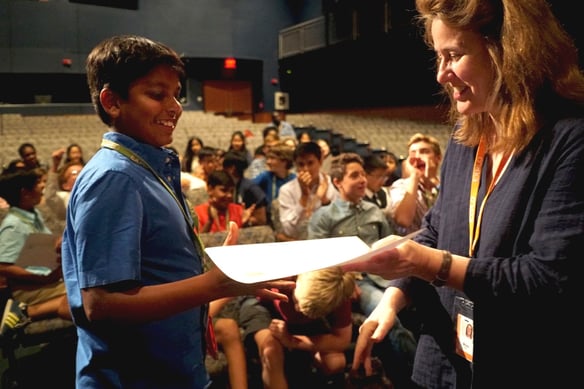
Student receiving their 7th Grade diploma from EXPLO President, Moira Kelly.
The Importance of Agency
At EXPLO, everything we do is centered around the concept of agency — that all of our students have the capacity to make choices about what they will explore, who they will engage with, what trips and activities they will attend, what they will eat. But making choices and taking ownership and responsibility for them is learned through experience, and the opportunities for learning must be developmentally appropriate and grow along with us. The seventh grade experience at EXPLO at Wheaton is intentionally infused with additional opportunities to practice this. Seventh graders have special privileges such as being walking to certain places on campus independently and being allowed to travel around with a small group of just seventh graders on trips to Canobie Lake Park and the New England Aquarium.
The seventh grade experience at EXPLO at Wheaton is intentionally infused with additional opportunities to practice [making choices].
Their increasing independence and responsibility is celebrated at the Seventh Grade Graduation night — a symbolic rite of passage where they dress up and have a special dinner, a ceremony with diplomas (where they learn about a good handshake and practice by shaking hands with EXPLO President and Executive Director Moira Kelly), ice cream, and a bonfire. It is magical for them, and it marks an important passing of time, not just from EXPLO at Wheaton but as they move forward into their adolescence. Wood comments on the deep significance of these rites of passage for seventh graders, that they require “tangible recognition” as they mature and prepare to join the adult community.
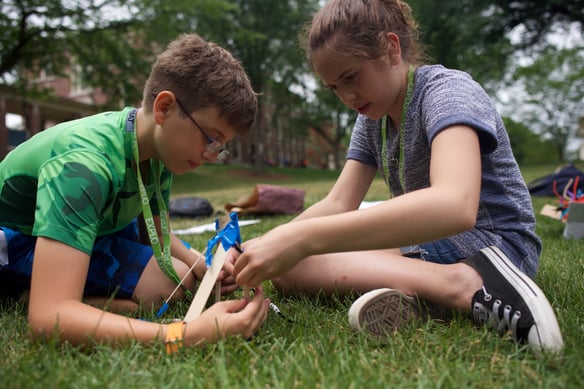
Learning for Who They Are
While the 12-year-old group may defy categorization, our 40+ years of experience has demonstrated that they thrive in places that take a multifaceted, flexible, and interdisciplinary approach to learning. As we write about in our blog post on Pioneers and Voyagers at EXPLO at Wheaton, sixth and seventh graders are eager to try on different identities; it’s how they figure out who they are. We design our courses to enable this experience and to encourage seventh graders to try new things and discover that it’s okay — in fact, it’s pretty great — to be multiple things at once.
“This is a time or space where being exposed to different ideas and trying new things can broaden self identity," says Kristi Jacobi, assistant director of curriculum and instruction at EXPLO and director of operations for the Wheaton programs. "You don’t have to be just a soccer star or just good at math. And our teachers are role models for this, because students learn about all of their different interests through the courses and workshops they take.”
. . . students have to learn how to acknowledge, respect, and tolerate different ideas — they are practicing empathy.
The seventh grade social muscles are flexed in class too, as the curriculum fosters group work and problem solving. Students learn the value of their own voice in that setting, and they also learn that you need many different voices, areas of expertise, and roles in order to accomplish something.
“The curriculum drives kids to collect individual ideas and synthesize them into a group effort,” Jacobi says.
In Build a Nation, for example, students are divided up into different countries and have to make decisions collectively about what specific monuments to build and, amongst nations, how to respond to a tsunami crisis. In these moments, students have to learn how to acknowledge, respect, and tolerate different ideas — they are practicing empathy.
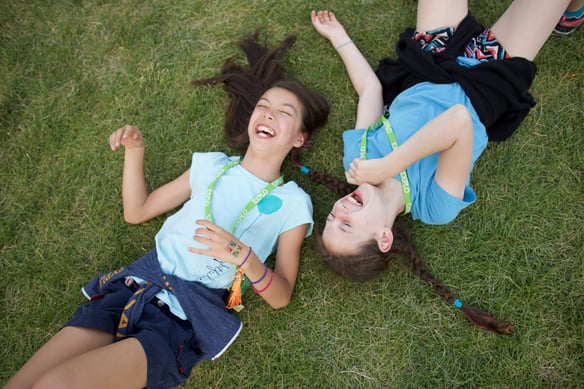
Discovering the World of People and Ideas — and Themselves
In many ways, seventh graders are truly right at the cusp of discovering the world of people and ideas we’re asking them to explore. As they reach, falter, and reach again to find meaning in their schoolwork, extracurricular activities, adult relationships, friendships, and social circles, they need just the right balance of a gentle push towards independence and a belay rope to ease the fall when things get too rocky. At the very least, we encourage seventh graders at EXPLO to feel emboldened as they try on their growing identity and remind them of the power they have for positive change in the world that lives just outside their door.

